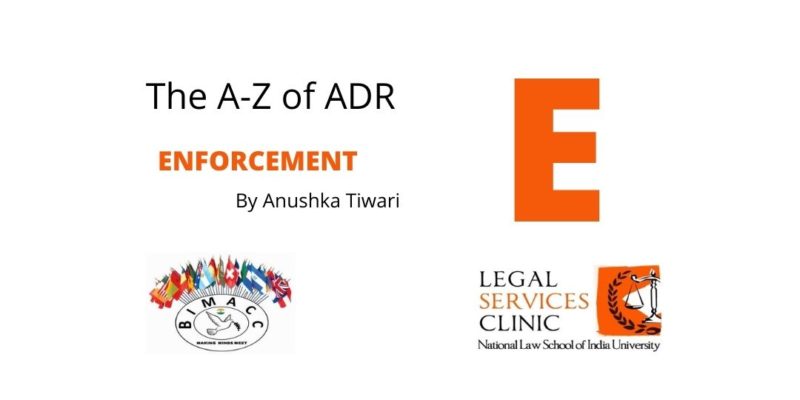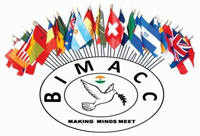
A-Z of ADR: Enforcement
– Anushka Tiwari (IV Year, NLSIU Bangalore)
ENFORCEMENT OF AN ARBITRATION AWARD
Securing an arbitration award is one thing and actually getting it enforced is another thing. Enforcing an award is especially complicated when the opposite party hasn’t even taken part in the arbitral proceedings. The procedure of enforcing an award is governed by the Arbitration and Conciliation Act, 1996 as well as the Civil Procedure Code, 1908. For India-seated awards (awards governed by Indian Law), i.e. “domestic awards”, Part I of the Act will be applicable. For awards governed by foreign law, i.e. “foreign awards”, Part II of the Act will be applicable. To ensure that your award is successfully enforced, you should make sure that the opposite party is efficiently served with the award and even other orders on time so that they cannot raise objections later. You should also take appropriate measures through attachment, notice etc.
The principles of natural justice will also be applicable throughout the proceedings and even to the enforcement of the award. An award holder can initiate execution proceedings before any court in India where assets are located. In case the subject-matter of the arbitration is of a specified value, commercial courts established under the Commercial Courts, Commercial Division and Commercial Appellate Division of High Courts Act, 2015, i.e. the Commercial Courts Act would have jurisdiction. The limitation period for the enforcement of arbitration awards is twelve years. Prior to the recent Arbitration and Conciliation (Amendment) Act, 2015 an application for setting aside an award would automatically lead to a stay on enforcement of the award. However, by virtue of the Amendment Act, a party challenging an award would have to move a separate application in order to seek a stay on the enforcement of an award.
ENFORCEMENT OF FOREIGN AWARDS IN INDIA
India is a signatory to the Convention on the Recognition and Enforcement of Foreign Arbitral Awards, 1958 (“New York Convention”) as well as the Geneva Convention on the Execution of Foreign Arbitral Awards, 1927 (“Geneva Convention”). If a party receives a binding award from a country which is a signatory to the New York Convention or the Geneva Convention and the award is made in a territory which has been notified as a convention country by India, the award would then be enforceable in India. The enforcement of a foreign award in India is a two-stage process which is initiated by filing an execution petition. Initially, a court would determine whether the award adhered to the requirements of the Act. Once an award is found to be enforceable it may be enforced like a decree of that court. However, at this stage parties would have to be mindful of the various challenges that may arise such as objections taken by the opposite party, and requirements such as filing original/ authenticated copy of the award and the underlying agreement before the court.
The arbitral award should have been given in that territory where, on the basis of reciprocity, the New York Convention is applicable. For territories to which the New York Convention is applicable, the government of India, in its official Gazette shall be declaring the names of States and territories where reciprocally the New York Convention will apply. The Foreign Awards (Recognition and Enforcement) Act, 1961 was passed which nearly 44 State territories were declared which had reciprocal acceptability of New York Convention. The list so declared in 1961,[1] still remains valid due to Section 85(2) (b) of the Arbitration Act, 1996.[2] If an award is made in a country which is not a signatory of New York Convention, then the provisions of the Section shall not be applicable to that award and that award shall not be treated as a foreign award under the present Act, 1996.
The SC in Bhatia International v. Bulk Trading S.A.,[3] observed that awards in arbitration proceedings which take place in a non-convention country are not considered to be ‘foreign award’ under the arbitration Act, 1996 and they would thus not be covered by Part II. This is an accepted approach among members of the New York Convention. For instance, under the English Arbitration Act, 1996, if an arbitral award is signed in a State which is a party to the New York Convention, English Courts can hear an appeal from the award if it was made under English law. Previously, the Delhi High Court in Naval Gent Maritime Ltd v Shivnath Rai Harnarain (I) Ltd.[4], had observed that a foreign award can be enforced as a decree. A similar approach had been adopted by the Bombay High Court in the case of Vitol S.A v. Bhatia International Limited[5] and the High Court of Madhya Pradesh in Narayan Trading Co. v. Abcom Trading Pvt. Ltd.[6]
ENFORCEMENT OF A MEDIATION SETTLEMENT AGREEMENT
You can enforce an international mediated settlement agreement either by litigation or arbitration. Enabling legislation and consent awards are also some options available. However, since these methods are considered inadequate, UNCITRAL has started working on making a new legal instrument to enforce such settlement agreements expeditiously. Even though a legislation for mediation doesn’t exist at this time in India unlike Arbitration and Conciliation, mediation has still been used for many years now to resolve international commercial disputes as well. The Supreme Court has laid down some guidelines in the Salem Bar Advocates Case[7] based on which enforcement guidelines can be culled out for settlement agreements in Mediation. There are a number of international mediation centres such as the ICC International Centre for ADR and the Singapore International Mediation Centre. However, since the United Nations Convention on International Settlement Agreements resulting from Mediation is fairly recent, time will tell regarding the effective enforcement of International Mediation Settlement Agreements.
Only legislation could achieve the level of predictability and certainty necessary to facilitate enforcement of settlement agreements resulting from conciliation.[8] The enforceability of mediation agreements varies according to the legal status of the mediated outcome and the extent to which it is recognized by local courts.[9] The Slovakian Law on Mediation recognizes different legal forms for mediated settlements.[10] It provides that mediated settlements must be in writing in order to be binding on the parties. The party may apply for execution of the settlement agreement if it is in the form of a notarial deed and has been ‘approved as conciliation before a court [or] arbitration body’. In the Netherlands, mediated settlements are statutorily accommodated by the legal mechanism of the declaratory settlement deed (Vaststellingsovereenkomst). In France and Austria, the relevant laws on mediation in civil matters are silent on the legal form of mediated settlements, implicitly acknowledging party’s autonomy to choose one of a number of legal forms to enforce agreements resulting from mediation.[11] In many jurisdictions, particularly those in the common law tradition, legislative provisions relating to the legal status and enforceability of mediated settlements frequently take the form of sector-specific regulations and are not uniform throughout the jurisdiction.[12] In Australia and certain US states, for example, the status of mediated agreements may depend on whether or not the mediations took place under the aegis of a court or tribunal.[13]
The EU Mediation Directives[14] recognized that mediation can provide a cost-effective and quick extrajudicial resolution of disputes in civil and commercial matters through processes tailored to the needs of the parties. Agreements resulting from mediation are more likely to be complied with voluntarily and more likely to preserve an amicable and sustainable relationship between the parties. The said EU directives recognised the importance of enforcement; it directs Member States to ensure that the parties to a written agreement resulting from mediation can have the content of their agreement made enforceable. It should be possible for a Member State to refuse to make an agreement enforceable if the content is contrary to its law, including its private international law, or if its law does not provide for the enforceability of the content of the specific agreement.W
Anushka Tiwari,
[1] As per C.A. arbitration quarterly, Vol. XVIII, No.3 October-December 1993 the following countries have reciprocal provisions in context to New York Convention, 1958:- Austria, Belgium, Botswana, Bulgaria, Cuba, Czechoslovak Socialist Republic, Chile, Denmark, Ecuador, Arab Republic of Egypt, Finland, France, Germany, Ghana, Greece, Hungary, Italy, Japan, Republic of Korea, Malagasy Republic, Mexico, Morocco, Nigeria, Netherlands, Norway, Philipines, Poland, Romania, Spain, Sweden, Switzerland, Syria Arab Republic, Thailand, Trinidad And Tobago, Tunisia, U.S.S.P., U.K., United Republic of Tanzania, U.S.A., Central African Republic, Kuwait, San Mario.
[2] Section 85 of the Arbitration Act, 1996
[3] AIR 2002 SC 1432
[4] 174 (2009) DLT 391
[5] 2014 SCC OnLine Bom 1058
[6] 2012 SCC OnLine MP 8645
[7] Salem Advocate Bar vs Union of India, Writ Petition (civil) 496 of 2002
[8] William K Slate II, Seth H Lieberman, Joseph R Weiner, Marko Micanovic, UNCITRAL (United Nations Commission on International Trade Law): Its workings in International Arbitration and a New Model Conciliation Law, 6 CARDOZO J. CONFLICT RESOL. 73, 95 2004.
[9] ibid
[10] Ibid at 76
[11] ibid
[12] ibid
[13] ibid
[14] 5 Para (6) Directive 2008/52/EC OF THE EUROPEAN PARLIAMENT AND OF THE COUNCIL of 21 May 2008 on certain aspects of mediation in civil and commercial matters.
– Anushka Tiwari (IV Year, NLSIU Bangalore)
Anushka Tiwari is a fourth-year student from the National Law School of India University (NLSIU), Bangalore.
BIMACC expresses its gratitude towards the author and to the members of the Legal Services Clinic, National Law School of India University (NLSIU) for their support in our collaborative efforts to promote ADR with this series titled “A-Z of ADR”. The purpose of this series is to increase the understanding of certain fundamental concepts of Alternative Dispute Resolution.
The Legal Services Clinic is a student-run committee that provides free legal services to the socially and the economically backward sections of the society who have difficulty accessing the judicial system. It also has a mandate of spreading legal awareness and providing free legal assistance to those who cannot afford it.
Website: www.legalservicesclinic.org/
Facebook: @legalservicesclinic
Email: lsc.nlsiu@gmail.com
Phone Number: 073586 73214
Disclaimer: The views and opinions expressed in this blog are those of the author and do not necessarily reflect the official policy or position of BIMACC, any of the members of the Board, or the empanelled neutrals. This blog is for informative purpose only and does not constitute legal advice in any manner whatsoever.
